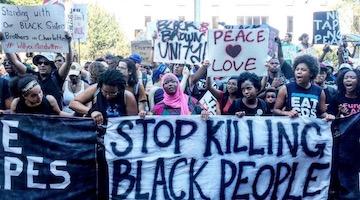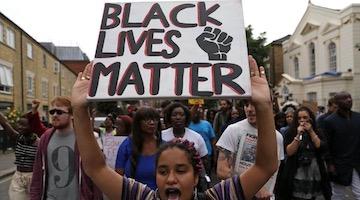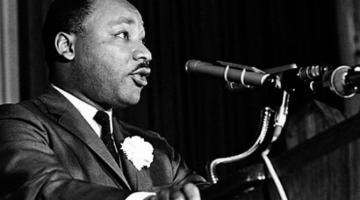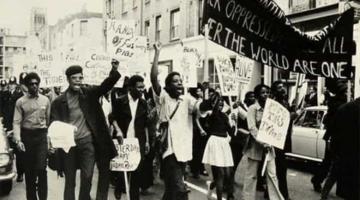Alicia Garza and her crew conducted what they claim is the biggest survey of Black political opinion ever -- but failed to ask a single question about foreign policy.
“The surveyors were not interested in Black people’s views on U.S. military violence abroad, or the impact of U.S. policies on poverty in the world, or anything at all about Africa.”
Alicia Garza, of Black Lives Matter fame, last week introduced her latest project in the pages of the New York Times: a survey of “more than 31,000 black people from all 50 states” to determine, as the headline announced, “What Black People Want.” The Black Census Project“is the largest independent survey of black people ever conducted in the United States,” wrote Garza. A collaboration of Garza’s Black Futures Lab, Color of Change, Dēmos, and Socioanalítica Research, the project “trained more than 100 black organizers and worked with some 30 grass-roots organizations” to elicit Black people’s views on a range of domestic subjects – but asked not a single question related to war and peace.
Garza & Co. have thus performed a kind of lobotomy on the Black polity in the United States, excising from public policy discussion Black Americans’ views on the nation’s endless military and economic wars against people of color around the world. Garza’s team appears to have operated on the premise that Black people have no opinion on the death of millions and the destruction of whole societies, crimes that are committed in their name by the U.S. government. As if Black Americans don’t see the connection between ever-expanding war budgets and constantly shrinking domestic social spending. The project is structured as if African Americans are provincial boobs who don’t give a damn about foreign affairs or the intersection of U.S. foreign and domestic policy.
“Garza’s team appears to have operated on the premise that Black people have no opinion on the death of millions and the destruction of whole societies.”
What is perfectly clear, is that the survey is designed to influence the election strategies of the Democratic Party, whose candidates, she writes, fail to “address the issues that affect black communities or meaningfully court them.” Instead, “time, money and effort are expended to identify and cater to moderate white voters who are already fickle about politicians and political parties. This has long been the Democratic establishment’s strategy, but they doubled down on it after the 2016 election when analysts proclaimed that the left’s undue focus on ‘identity politics’ sent moderate white voters to the Republican side.”
Most corporate Democratic candidates also avoid foreign policy issues whenever possible. Garza and her corporate-philanthropy-funded crew impose the same strictures on Black discussion, in hopes of creating a saleable electoral campaign product for Democrats.
“The project is structured as if African Americans are provincial boobs who don’t give a damn about foreign affairs or the intersection of U.S. foreign and domestic policy.”
The survey’s web page is keen to advertise that the 31,000 “Black Census respondents are highly engaged in elections: Not only did more than 73 percent report voting in 2016, but 40 percent also report some other form of electoral activity, such as engaging as donors, volunteers, or canvassers.” The message is: these are folks that need to be put to work on some worthy Democrat’s campaign. “As the unwavering base of the Democratic Party, if the politically engaged Black population ceased to vote and gave up on the system, it would upend the Democratic Party and have devastating effects on our democracy as a whole,” says Garza’s Black Census Project, in a transparent pitch for its availability to save the Party and “the system.”
The survey is quite methodical in providing questions to guide candidates in navigating Black domestic political views. It confirms that the Black political consensus on economic justice at home remains intact, with large majorities of respondents favoring high taxes on the rich, increased minimum wages, and affordable health, higher education and housing. (The survey does not ask if any of these things should be a right.) Predictably, three-quarters of those surveyed want cops made accountable for their misconduct, and just over half want community boards created to supervised police departments. But the surveyors were not interested in Black people’s views on U.S. military violence abroad, or the impact of U.S. policies on poverty in the world, or anything at all about Africa, a continent the United States has militarily occupied since 2008. We do learn that President Obama, who effectuated the occupation, enjoys an 85 percent approval rating among respondents, as does Black Lives Matter.
“Garza’s Black Census Project is available to save the Party and ‘the system.’”
The survey is a hustle to make Garza, Color of Change and their (already deeply-connected) financial backers bigger players in the Democratic Party – without challenging lawless U.S. empire, “the greatest purveyor of violence in the world, today,” as Dr. Martin Luther King Jr. stated more than half a century ago, and as Malcolm X hammered home till his dying breath.
Garza knows what she’s doing. The Movement for Black Lives platform, titled “A Vision for Black Lives: Policy Demands for Black Power, Freedom and Justice," is quite radical in its demands to end the (domestic) war on Black people, and on reparations, disinvestment of oppressive government and economic institutions, economic justice, community control, and decriminalizing Black political activity. It puts forward no demands on U.S. foreign policy, but instead offers an apology: “While the movement's platform largely focuses on the implementation of domestic policies that will advance black communities in America, the movement also recognizes that patriarchy, exploitative capitalism, militarism, and white supremacy know no borders.”
But Garza knows the borders of what is acceptable to the corporate Democratic Party, and adheres to the limits imposed by the fat cats – who are also among her donors. This is sometimes called political “capture” of dissidents by the ruling class. However, the term “capture” hardly fits when the prey is begging to be caught.
“The absence of foreign policy questions is a deliberate ploy to make the project and its players palatable to imperialists.”
As Black academic Jennifer Nash writes in this week’s edition of the BAR Book Forum, Black feminists tend to hold “proprietary attachments to intersectionality…to keep it close, to guard it.” Yet Alicia Garza pretends, for Black Census Project purposes, to be blind to the intersection between U.S. slaughter of millions of non-white people abroad and the mass Black incarceration regime at home. She doesn’t respect Black folks enough to even ask if they approve or disapprove of their government’s conduct abroad. The absence of foreign policy questions is a deliberate ploy to make the project and its players palatable to imperialists. Garza not only pretends that she doesn’t see the connection between the trillion dollar U.S. military budget versus endless austerity for human needs programs, she has overseen a survey that pretends the rest of Black America is also blind and dumb. Her survey is an insult to the Black Radical Tradition, which is rooted in solidarity with the oppressed peoples of the world and has resulted in Black America winning allies and emulators around the globe.
Fortunately, an organization exists that will never forget the six million Congolese that have been slaughtered to date as a result of U.S. foreign policy – the worst genocide since World War Two – and which fights daily to bring Washington’s “endless wars” to a halt: the Black Alliance for Peace. But that’s not the kind of project that corporate billionaires fund.
BAR executive editor Glen Ford can be contacted at Glen.Ford@BlackAgendaReport.com.
COMMENTS?
Please join the conversation on Black Agenda Report's Facebook page at http://facebook.com/blackagendareport
Or, you can comment by emailing us at comments@blackagendareport.com













